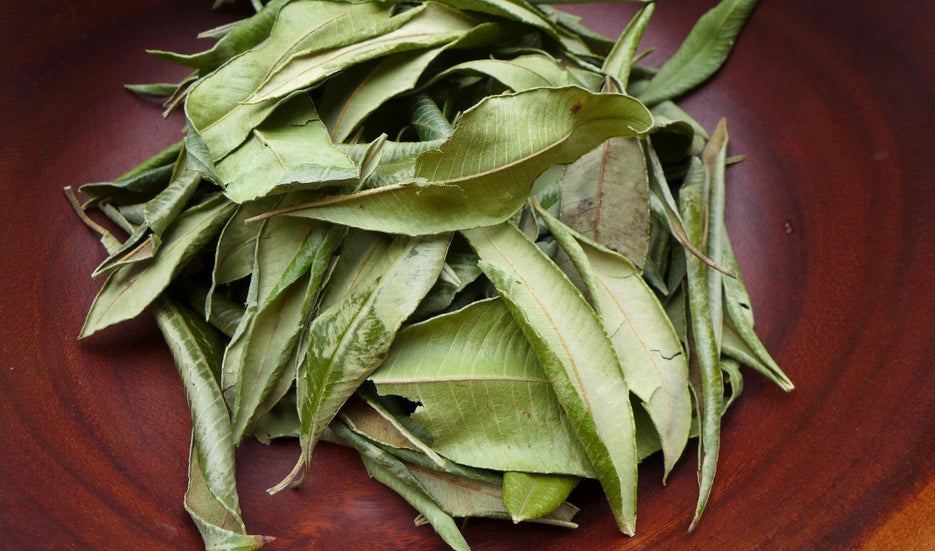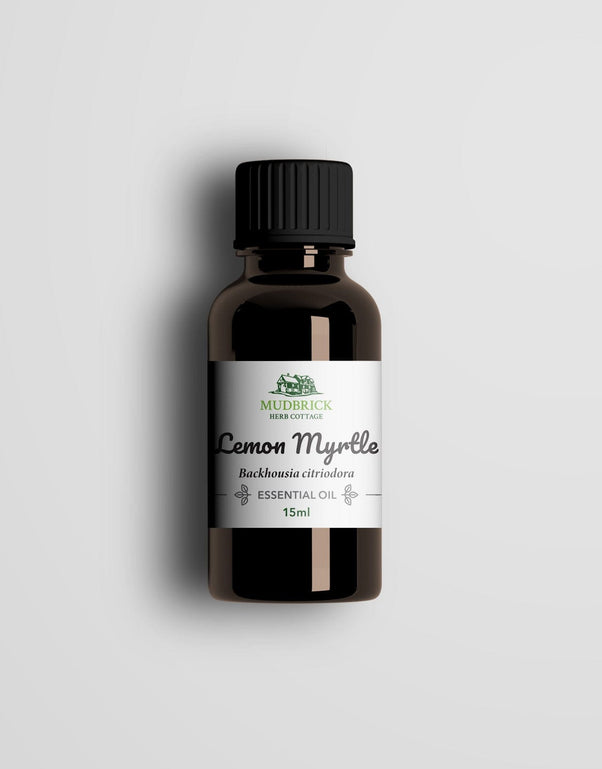Health Benefits of Lemon Myrtle Oil

Considering its history in mythology, lemon myrtle essential oil is often an overlooked oil in comparison to other choices on the market. With origins stretching back over tens of thousands of years, this herb has been used by indigenous Australians to treat headaches, repel insects, and more.
But as scientists & naturopaths have come to discover, there are far more benefits of lemon myrtle than just those. It can help support immune & respiratory health, improve skin quality, and fight off microbes.
In this guide, you’ll get an insight into these health benefits of lemon myrtle oil, as well as how to use it and necessary precautions to take.
What is Lemon Myrtle Essential Oil?
Lemon myrtle essential oil is extracted from the leaves and twigs of the lemon myrtle tree. Native to the Australia, the plant (Backhousia citriodor) is treated with hot steam to remove the oil, a process known as steam distillation. It’s typically a yellow or green colour and has a sweet, herbal aroma to it. With woody notes, it’s often used in perfumes & colognes as well.
Key Components of Lemon Myrtle Essential Oil
The key components that make up lemon myrtle essential oil are predominantly citral, along with two isomeric aldehydes; geranial and neral.

Citral is helpful for the body as it contains both anti-fungal and antibacterial properties, hence why it can be used as a mouthwash for bad breath. The geranial and neral components possess antioxidant, anti-fungal and anti-inflammatory properties. So if you’re looking to nourish the skin and help with inflammation, lemon myrtle oil can certainly help.
Health Benefits of Lemon Myrtle Essential Oil
What health benefits does lemon myrtle essential oil offer? If you’re looking to improve your immune support system or improve your skincare routine, specifically with regard to acne and oily skin, then you’ll want to get your hands on this oil.
Immune System Support
Your immune system helps protect your body from foreign bacteria, viruses, infections, and diseases. When your immune system is compromised, that can lead to a wealth of problems.
The high levels of citral found in lemon myrtle help support the immune system, particularly during the colder months when cold and flu season is present. A study done by the NIH found that this essential oil has antioxidant and anti-inflammatory properties that may help those improve their immune systems.
Respiratory Health
The benefits of lemon myrtle essential oil expand to respiratory health, particularly with it being anti-inflammatory. It can help relieve congestion and mucus buildup in the sinuses, making it easier to breathe when you have a cold or stuffy nose.
Lemon myrtle oil contains up to 96% of the aldehyde citral that has strong antimicrobial activity. As a result, it’s considered to be an effective aid in assisting conditions like bronchitis and sinusitis. This is backed by studies like Thieme, who mentions the use of lemon myrtle oil being used for respiratory tract diseases.
Antimicrobial Properties
Lemon myrtle can help boost your immune system and alleviate stress on the respiratory system, but did you know it can also prevent infections from happening before they happen? The antimicrobial properties help defend your body against bacteria, fungi, and viral infections.
If you’re worried that you may be coming down with a cold, take a few deep breaths directly from the bottle. And to keep you & your family safe (and healthy), you can use the oil to disinfect areas around your home, like the kitchen & bathroom.
Skincare Benefits
If you suffer from acne and oily skin, lemon myrtle essential oil might be your new best friend. As far as skincare benefits go, the oil can reduce oily skin (without drying it out completely) and help reduce acne. A study of Korean skincare showed that “acne grades significantly decreased” in the control group, which was topically treated with lemon myrtle oil.
To enjoy the benefits of lemon myrtle essential oils, dilute a few drops of it into a carrier oil. Apply to your skin both morning and night to maximise the results, and repeat for several weeks, even after your acne resolves.
There are many studies that have promoted the benefits of lemon myrtle oil in skincare. One example by Biomedical Dermatology found that the oil is a safe and skin-soothing substance useful for tackling acne by reducing the appearance of erythema (skin redness).
How to Use Lemon Myrtle Essential Oil
To get the most out of this versatile essential oil, it’s worth knowing how to use it. Lemon myrtle essential oil can be inhaled, applied topically on your skin, or as a natural cleaning product. Here are a few other ways to use the oil:
1. Combine with vinegar for a surface cleaner
An all-natural surface cleaner is much more effective in cost than what you’ll find in your local supermarket. Apply 10-15 drops of the oil with ½ a cup of white vinegar. Put into a spray bottle, add water, and shake well before using.
2. Add a few drops to the bath to appease sore muscles
If you’ve just done an intensive workout, add 3-4 drops to a carrier oil, then add that mixture to the bath to help reduce muscle soreness, muscle spasms, and most importantly, inflammation.
3. Use it to keep your clothes smelling fresh in the wash
If your clothes have a habit of losing their freshness after washing, then mix a few drops of the oil into your wash detergent. It provides a pleasant and fresh smell that will linger long after cleaning the clothes.
4. Implement it into your skincare routine
To use lemon myrtle oil safely on the skin, make sure to add it to a carrier oil before applying it to the skin, usually 1-2 drops of essential oil per tablespoon of carrier oil. It makes for a great skin serum, which can be applied in the morning and before going to bed.
If you’re looking to use the oil on a daily basis, there are plenty of practical suggestions worth mentioning. On top of these, you might want to look at introducing it into aromatherapy activities, whether that’s inhaling it through steaming or using it as a massage oil.
Precautions & Potential Side Effects
Despite being a versatile essential oil with many benefits, it’s important to be aware of the potential side effects associated with lemon myrtle oil.
We never recommend ingesting it or any other essential oil, as it can cause severe medical reactions because of its toxicity. If applying topically, you should patch test it on a less sensitive area of your body. If you have an adverse reaction, it will not be in the same place as the problem area you planned to treat.
We also strongly advise you to consult a healthcare professional before use, particularly those who are pregnant or have specific health conditions.
While there are some great health benefits of using lemon myrtle essential oil, it’s important to be mindful of how you’re using it.



